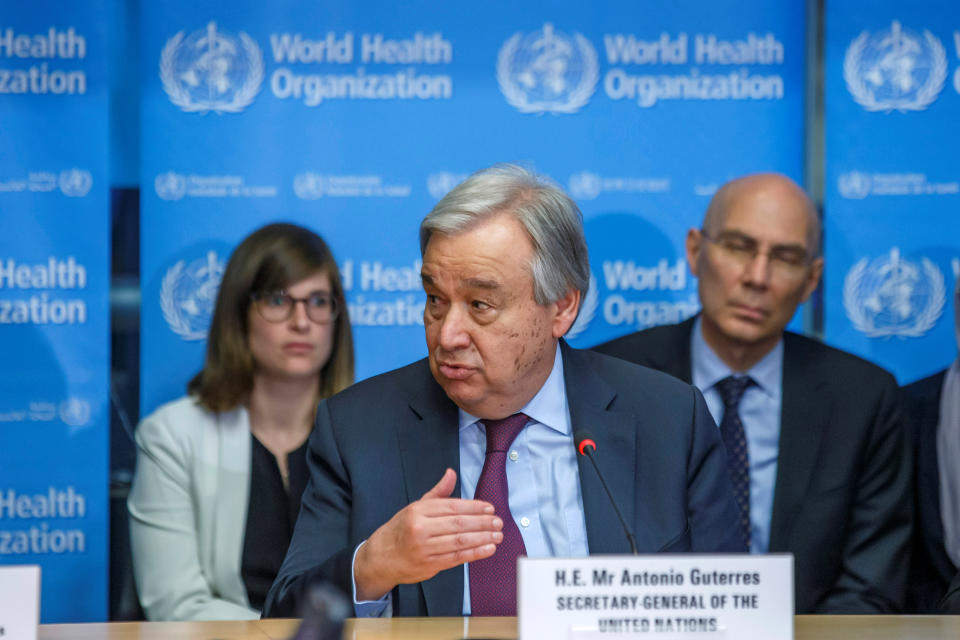Trump's coronavirus dispute with World Health Organization is ‘tragic’: Ex-Obama official
The “tragic rift” between the Trump administration and the World Health Organization (WHO) has damaged the global response to the novel coronavirus and hindered the world’s leading public health group, said Gayle Smith, who helped fight the Ebola outbreak in 2014 as the National Security Council’s top development official and later became the head of USAID under Obama.
Smith acknowledged that the WHO “is not a perfect organization” but called it “the heartbeat of a global response” whose services are of unique importance at “the height of a pandemic.”
“It's a bit like saying you don't like the fire chief so you're going to burn down the firehouse while your house is on fire,” Smith, now the CEO of global anti-poverty group ONE Campaign, told Yahoo Finance Editor-in-Chief Andy Serwer on Sept. 1.
“[You] maybe get the fire chief, but your house is going to burn to the ground,” she adds.

In April, Trump said he was suspending U.S. funding for the WHO, citing the organization’s opposition to travel restrictions imposed upon individuals departing from China. The following month, Trump announced the U.S. would cut ties with the organization altogether.
‘It needs our support, rather than our attacks’
Trump has repeatedly referred to U.S. travel restrictions on flights from China that took effect on Feb. 2 as a key part of his coronavirus response. But the rules included loopholes that allowed 8,000 Chinese and other foreign individuals traveling from the Chinese territories of Hong Kong and Macau to visit the U.S. in the first three months after the ban, the Associated Press reported.
The WHO, an agency within the United Nations, has faced backlash from critics beyond Trump, who say the organization was too trusting of early Chinese accounts of the virus and too slow in declaring a global health emergency.
“We have, as I say, the obligation and the opportunity to make it an even better organization,” Smith says. “But it needs our support, rather than our attacks.”

Smith spoke to Yahoo Finance Editor-in-Chief Andy Serwer in an episode of “Influencers with Andy Serwer,” a weekly interview series with leaders in business, politics, and entertainment.
More than six months since the WHO declared the coronavirus a pandemic, on March 11, the international community has yet to contain the outbreak.
As of Thursday morning, the world has suffered more than 34 million coronavirus cases and more than 1 million deaths from the disease, according to Johns Hopkins University. The number of daily cases worldwide increased 3% over the 14 days prior to Sept. 30, The New York Times reports.
Smith, who worked alongside former Vice President Joe Biden, said she would congratulate him if he wins the presidential election in November.
Earlier this month, the WHO released a plan for the global distribution of a potential coronavirus vaccine, putting an emphasis on the world’s most vulnerable populations. On Wednesday, U.N. Secretary General António Guterres called on countries to make plans to aid the eventual international distribution of a vaccine.
Smith said the U.S. should play a leading role in preparation for the provision of a vaccine worldwide.
“We need a plan globally so that we've got vaccine equity, which isn't simply fairness,” she says. “But it is also the kind of coverage that the epidemiology tells us that we need so that we can shorten the lifespan of this pandemic.”
“That requires leadership and engaging the rest of the world in a way that I don't think we're seeing now,” she adds.
Read more:
Ex-Obama official on the 'most troubling' difference between Ebola and COVID responses
David Chang: Restaurant failures could have ‘severe repercussions' for other businesses
Bill Gates: We should be able to ‘manufacture a lot of vaccines’ next year
Honest Company Founder Jessica Alba: Ethics shouldn’t be a ‘marketing ploy’
Read the latest financial and business news from Yahoo Finance

